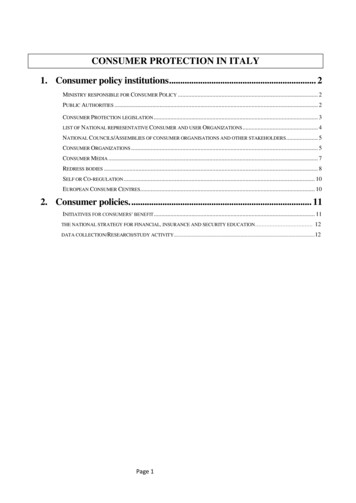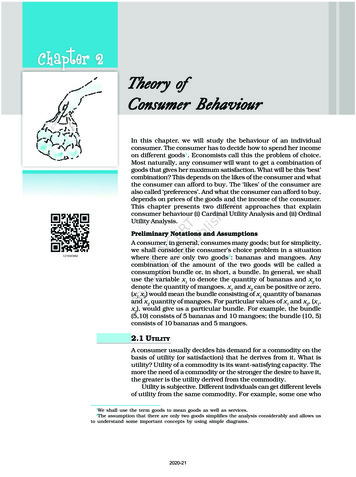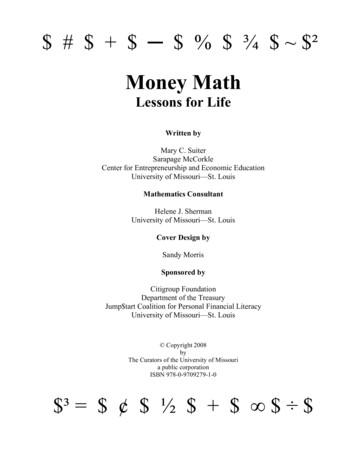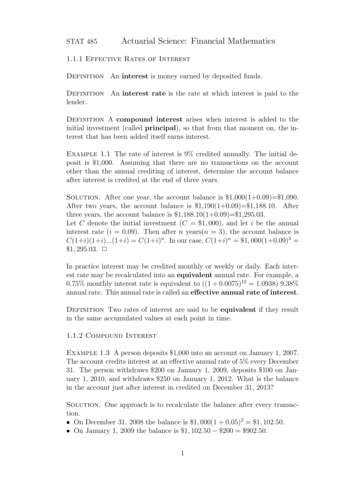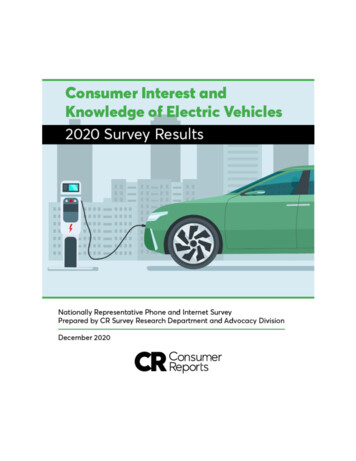
Transcription
Consumer Interest and Knowledge of EVs: 2020 Survey ResultsTable of ContentsIntroduction3Highlights3EVs: Understanding and Interest4EVs: Attitudes and Barriers6EVs: Policies and Incentives10Methodology13ABOUT CONSUMER REPORTSConsumer Reports is a nonprofit membership organization that works side by side withconsumers to create a fairer, safer, and healthier world. For 80 years, CR has providedevidence-based product testing and ratings, rigorous research, hard-hitting investigativejournalism, public education, and steadfast policy action on behalf of consumers’interests. Unconstrained by advertising or other commercial influences, CR hasexposed landmark public health and safety issues and strives to be a catalyst for proconsumer changes in the marketplace. From championing responsible auto safetystandards, to winning food and water protections, to enhancing healthcare quality, tofighting back against predatory lenders in the financial markets, Consumer Reports hasalways been on the front lines, raising the voices of consumers.For more information about our Advocacy work or to download additional policy reports,please visit ConsumerReports.org/Advocacy.2
Consumer Interest and Knowledge of EVs: 2020 Survey ResultsINTRODUCTIONThis nationally representativesurvey of 3,392 adults residing inthe U.S. with valid driver’slicenses was conducted byphone and Internet from July 29through August 12 of 2020.Questions about electric vehicles(EVs) were offered in Englishand Spanish. The purpose wasto better understand Americans'familiarity with and attitudestoward EVs, including what theysee as incentives and barriers toowning them.HIGHLIGHTS KNOWLEDGE: Approximately 98% of drivers say they’ve heard of electric vehicles, butonly 30% say they’re knowledgeable about them. 68% say they have “heard of” plug-inEVs but “don't know much about them.” BARRIERS: Charging is a concern for many; among drivers who are not definitely planningto purchase or lease a plug-in EV for their next vehicle, about half (48%) say "not enoughpublic charging stations" is holding them back.§ Among all drivers, "public charging stations along highways" is the most commonpolicy that would increase their interest in owning an EV (42%).§ However, 72% of all drivers say that if they owned an EV, they would most likelydo most of their charging “in their private driveway or garage.” BENEFITS: More than half of American drivers of both major political party affiliationsagree or strongly agree that:§ widespread electric vehicle use will help reduce air or climate pollution: 84% ofDemocrats say they Agree or Strongly Agree; 62% of Republicans say they Agreeor Strongly Agree.§ automakers should make a variety of vehicle types (i.e. pickup trucks, SUVs)available as plug-in electric models: 80% of Democrats say they Agree orStrongly Agree; 62% of Republicans say they Agree or Strongly Agree.§ electric utility providers should offer discounts to charge plug-in electric vehiclesat times when electricity demand is low: 77% of Democrats say they Agree orStrongly Agree; 59% of Republicans say they Agree or Strongly Agree.3
Consumer Interest and Knowledge of EVs: 2020 Survey ResultsELECTRIC VEHICLES: Understanding and InterestFor this survey, CR defined plug-in electric vehicles (EVs) as "vehicles that are electric only”and do not use gasoline. Hybrids like Toyota’s Prius or Prius Prime, for example, use bothgasoline and electric power, and for the purposes of this survey are not EVs.We had drivers characterize their EV knowledge. Nearly all say they have heard of them (only2% haven’t). However, the majority (68%) say they don't know much about them.Which of the following best describes your knowledge of plug-in electric vehicles?8%2%I've never heard of a plug-inEV beforeI've heard of plug-in EVs butdon't know much about them21%I have heard of plug-in EVsand know quite a bit aboutthemI know a lot about plug-in EVs68%Base: Respondents with valid driver's licenses.Despite this lack of knowledge, drivers are generally interested in electric vehicles. 71% ofdrivers have at least some interest in getting an EV, with 31% saying they would considergetting, or would definitely get, an EV the next time they purchase a vehicle.Which of the following statements best describes your thoughts on buying orleasing a plug-in electric vehicle?4% I definitely plan on getting an EV for mynext vehicle29%27% I would consider getting an EV as mynext vehicle I have some interest in getting an EV inthe future, but not for my next vehicle I have no interest in ever getting an EV40%4
Consumer Interest and Knowledge of EVs: 2020 Survey ResultsWe found EV interest varies by age. 37% of Millennials (born 1982-1997) say they either willdefinitely get, or will consider getting, an EV for their next purchase. Interest among Gen X(1966-1981) is lower, at 31% who plan on or will consider an EV for their next vehicle; 25% ofBaby Boomers (1946-1965) responded this way, as did 21% of the Silent Generation (19281946). The biggest generational differences are among people who “have no interest in evergetting an EV.” 22% of Millennials responded this way, 30% of Gen X, 34% of Baby Boomers,and over 40% of people in the Silent Generation.Which of the following statements best describes your thoughts on buying orleasing a plug-in electric vehicle?MillennialGen X5%Baby %39% I definitely plan on getting an EV for my next vehicle I would consider getting an EV as my next vehicle I have some interest in getting an EV in the future, but not for my next vehicle I have no interest in ever getting an EVInterest also varied by political affiliation. Democrats are more likely than Republicans to saythey would consider purchasing an EV for their next vehicle. Still, most Democrats (79%) andRepublicans (63%) say they at least have some interest in electric 26%34%17%37%35%38%38%44%NOTE: Due to rounding, figures in some graphs may sum to more or less than 100%.5
Consumer Interest and Knowledge of EVs: 2020 Survey ResultsELECTRIC VEHICLES: Attitudes and BarriersWe asked drivers “How far would an EV would have to be able to travel between charges foryou to consider purchasing or leasing one?”About half of U.S. drivers said they would consider purchasing an electric vehicle if it could driveat least 300 miles on a single charge. About half said their single-charge threshold was over 300miles, with 24% saying 300 to less than 400 miles would be adequate, and another 25% sayingan EV would have to travel over 400 miles on a single charge for them to consider purchasingone.We asked drivers to choose from a list of attributes which would most encourage them topurchase a plug-in electric vehicle.Costs less to charge than fueling a gasoline-powered vehicle21%Lower maintenance costs than gasoline-powered vehicles17%A purchase price similar to a gasoline-powered vehicle in the sameclass17%11%Ability to charge at homeHigher reliability than gasoline-powered vehicles11%No tailpipe emissions (exhaust fumes)9%Not having to pump gas9%Better acceleration than gasoline-powered vehicles3%Car runs quietlyAttractive styling, other aesthetic features2%1%Base: Respondents with valid driver's licenses.NOTE: Due to rounding, figures in some graphs may sum to more or less than 100%.6
Consumer Interest and Knowledge of EVs: 2020 Survey ResultsWe asked all drivers except the 4% who definitely plan to buy or lease an electric vehicle next which, if any, of a set of attributes areholding them back. Respondents could select up to three choices.Of the following attributes, which, if any, are holding you back from purchasing or leasing a plug-in electric vehiclefor your next vehicle?Not enough public charging stations48%Purchase Price43%Insufficient driving range42%30%Don't know enough about EVs to buy oneNowhere to charge it at home28%Long charging times21%Lack of options among plug-in electric models currently on the market14%Higher state registration fees for EVsDifficult to use technologyOther9%2%6%Base: Respondents with valid driver's licenses who do not “definitely” plan to get a plug-in EV for their next vehicle purchase.7
Consumer Interest and Knowledge of EVs: 2020 Survey ResultsWe asked all drivers which, if any, of a set of state or federal policies, would most likely encourage them to purchase an EV.Respondents were asked to select their top three choices.Of the following state or federal policies, which, if enacted, would most likely increase your interest in purchasing orleasing a plug-in electric vehicle?Public charging stations along highways42%Discounts to install a home charging station37%Discounted charging rates from your electric utility provider35%34%Rebates at the time of purchase or leaseRebates as tax credits30%Access to workplace charging stations16%Charging stations or access to plug-in spots at apartment buildings13%Preferential parking spaces for EVsAccess to HOV lanes with only the driver in the vehicle8%7%None18%Base: Respondents with valid driver's license.8
Consumer Interest and Knowledge of EVs: 2020 Survey ResultsWe also asked drivers where, out of a list of public and private charging options, they think theywould do most of their charging if they were to own an EV. The vast majority (71%) said theywould charge an EV in their private driveway or garage; the next-most-common response, atjust 9%, was "At public fast-charging stations in my community" (equivalent to gas stations).Responses to this question varied significantly by living situation, likely by whether or not ahome has a private driveway or garage. More than half of people who live in single-familyhouses, mobile homes, and multi-family houses say that they would charge a vehicle in thedriveway or garage. This is lower among people who live in apartments (though not non-existentprobably because some apartment complexes have private garages or parking spots).However, people who live in apartments are also not likely to say they would charge a vehicle ata charger provided by their apartment building. These options may not exist in their apartmentcomplex. In fact, the most common response among people who live in larger apartmentbuildings (with more than 12 housing units) is public fast-charging %Overall2%7%6%4%1%Single-familydetached house11%9%7%0%Row house19%8%9%5%9%11%6%14%7%1%1%2%2 to 12 unitbuilding12 to 20 unitbuilding20 unitbuilding0%12%4%2%2%Mobile homeAt personal garage/drivewayAt public fast-charging stationAt public charging stations at places like restaurants and shopping centersAt workAt apartment building or complexOther9
Consumer Interest and Knowledge of EVs: 2020 Survey ResultsELECTRIC VEHICLES: Policies and IncentivesWe asked U.S. drivers about federal and state policies related to electric vehicle use, andprograms that might incentivize drivers to switch to an electric vehicle.Strongly agree / agree4%3%Neither agree nor disagreeDisagree / Strongly disagreeUnsureStatement: Automakers should make a variety ofvehicle types (like sedans, minivans, SUVs andpickups) available as plug-in electric models22%71%7%3%21%68%12% 3%25%14%27%60%Statement: Electric utility providers should offerdiscounts to charge EVs at times when electricitydemand is low.Statement: Incentives and tax rebates for plug-in EVsshould be available to all consumers, including highincome.4%Statement: My state should invest money to increasethe availability of plug-in EV charging stations.55%10
Consumer Interest and Knowledge of EVs: 2020 Survey ResultsWe also asked whether a state government or the federal government should requireautomakers to offer electric vehicles. Just over a third of respondents support these policies,about a third are neutral on the subject, and about a quarter say they disagree.Statement: My state should require automakers to offer plug-in EV options.Strongly agree5% 12%9%AgreeNeither agree nor disagreeDisagree17%25%Strongly disagreeUnsure33%Base: Respondents with a valid driver's license.Statement: The federal government should require automakers to offerplug-in EV options.Strongly agree9%AgreeNeither agree nor disagree4% 13%17%Disagree25%Strongly disagreeUnsure32%Base: Respondents with a valid driver's license.11
Consumer Interest and Knowledge of EVs: 2020 Survey ResultsAmericans with drivers’ licenses were asked if they agreed, disagreed, or were unsure aboutwhether increased electric vehicle use would help reduce air or climate pollution. 72% said theyagree (Agree Strongly Agree) with only 7% saying they disagree (Disagree StronglyDisagree). Opinions on this differ based on political affiliation. 84% of people who identify as aDemocrat said they agreed; 58% of Republicans agreed. 71% of drivers who identified asIndependent or Other agreed.Statement: Widespread electric vehicle use will help reduce air or climate pollution.All Drivers3% 4%4%Strongly AgreeAgree33%17%Neither agree or disagreeDisagreeStrongly Independents5% 4%4%45%27%22%9%20%23%39%44%38%NOTE: Due to rounding, figures in some graphs may sum to more or less than 100%.12
Consumer Interest and Knowledge of EVs: 2020 Survey ResultsSURVEY METHODOLOGYThis nationally-representative survey of 3,879 adults residing in the U.S. was conductedby phone (n 121) and Internet (n 3,758) by NORC from July 29 through August 12, 2020.It was fielded through NORC's AmeriSpeak Panel, a nationally representative probabilitybased panel, in both English (n 3,809) and Spanish (n 70). Questions about electricvehicles were asked of the 3,392 who have valid driver's licenses. Panelists were initiallyoffered the cash equivalent of 2 for taking the survey regardless of which section theyqualified for. This was increased to 5 on August 11 to boost engagement toward the endof the field period. These data were weighted separately for each section to providenationally-representative estimates of the U.S. adult population based on sex, age,education, race/ethnicity, census region, housing tenure, and telephone status.After weighting, the Electric Vehicles national sample (licensed drivers) is: 51% female Median age of 47 23% have a household income of less than 30,000 per year; 27% make at least 30,000 and less than 60,000; 27% make at least 60,000 and less than 100,000; and 22% have an annual household income of 100,000 or more. 34% have a bachelor’s degree or above 72% are white, non-Hispanic13
Consumer Reports is a nonprofit membership organization that works side by side with consumers to create a fairer, safer, and healthier world. For 80 years, CR has provided evidence-based product testing a

